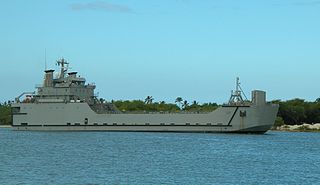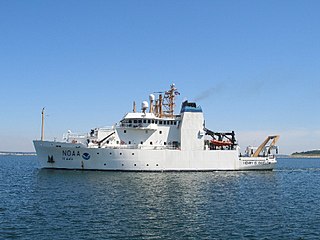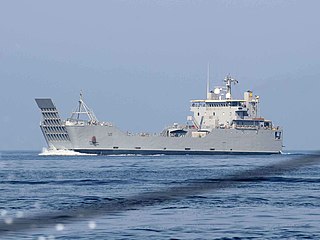
Brehon Burke Somervell was a general in the United States Army and Commanding General of the Army Service Forces in World War II. As such he was responsible for the U.S. Army's logistics. Following his death, The Washington Post lauded him as "one of the ablest officers the United States Army has produced".

USNS Adventurous (T-AGOS-13) was a Stalwart-class modified tactical auxiliary general ocean surveillance ship of the United States Navy in service from 1988 to 1992. She was in non-commissioned service in the Military Sealift Command from 1988 to 1992, operating during the final years of the Cold War. She was transferred to the National Oceanic and Atmospheric Administration (NOAA) in 1992 and in 2003 was commissioned into service with NOAA as the fisheries research ship NOAAS Oscar Elton Sette.

USNS Titan (T-AGOS-15) was a Stalwart-class modified tactical auxiliary general ocean surveillance ship in service in the United States Navy from 1989 to 1993. From 1996 to 2014, she was in commission in the National Oceanic and Atmospheric Administration (NOAA) fleet as the oceanographic research ship NOAAS Ka'imimoana.

General Frank S. Besson-class logistics support vessels (LSV) are the largest powered watercraft in the United States Army, and are designed to give the Army a global strategic capability to deliver its vehicles and cargo.

Motor torpedo boat PT-658 is a PT-625-class Higgins 78-foot (24 m) PT boat, built for the United States Navy during World War II. PT-658 is a prime example of US Navy motor torpedo boat development during World War II. PT-658 was in the last group of four boats delivered from the 36-boat contract NObs-1680, October 1944 for PT-625 to PT-660. Delivered and accepted on July 31, 1945, she was fitted with all of the latest armaments and design modifications as a result of lessons learned from previous contracts and battlefield experience. In this way, PT-658 is a showcase of the final form that motor torpedo boats would take by the end of World War II. PT-658 was listed on the National Register of Historic Places on September 4, 2012. Of three PT boats listed on the National Register, she is one of 2 maintained in operating condition.

The BRP Bacolod City (LS-550) is the lead ship of two Bacolod City class logistics support vessel, and is based on a helicopter capable variant of the US Army's Frank S. Besson class. She is also considered one of the most modern transport ships in the Philippine Navy, having been commissioned during the early 1990s. She was previously known as BRP Bacolod City (LC-550) prior to a classification change implemented by the Philippine Navy starting April 2016.

The BRP Dagupan City (LS-551) is the second and last ship of two Bacolod City class logistics support vessel, and is based on a helicopter capable variant of the US Army Frank S. Besson class. She is also considered one of the most modern transport ships in the Philippine Navy, having been commissioned during the early 1990s. She was previously known as BRP Dagupan City (LC-551) prior to a classification change implemented by the Philippine Navy starting April 2016

The Bacolod City class is a ship class of two Logistics Support Vessels currently in service of the Philippine Navy, commissioned during the early 1990s. These ships were based on a helicopter capable variant of the United States Army's General Frank S. Besson, Jr. class Logistics Support Vessel.
Bollinger Shipyards is an American constructor of ships, workboats and patrol vessels. Its thirteen shipyards and forty drydocks are located in Louisiana and Texas. Its drydocks range in capacity from vessels of 100 tons displacement to 22,000 tons displacement. The firm was founded in 1946.

NOAAS Henry B. Bigelow is a fisheries research vessel operated by the United States' National Oceanic Atmospheric Administration (NOAA). She is the second in a class of five new fisheries research vessels. She is named after Henry Bryant Bigelow (1879-1967), the American oceanographer, zoologist, and marine biologist who founded the Woods Hole Oceanographic Institution in Woods Hole, Massachusetts.

USNS Marie Tharp (T-AGS-66) is a Pathfinder-class oceanographic survey ship operated by the Military Sealift Command of the United States Navy. The seventh ship in her class, Marie Tharp is named for oceanographer Marie Tharp; the ship was renamed in 2023 from Maury.

The Polar Security Cutter Program is a program to recapitalize the United States Coast Guard's aging fleet of icebreakers, currently consisting of the heavy icebreaker USCGC Polar Star and the medium icebreaker USCGC Healy, with three new multi-mission vessels referred to as Polar Security Cutters (PSC). These heavy polar icebreakers will allow the USCG to perform its statutory missions in the Arctic as well as support the United States Antarctic Program with Operation Deep Freeze.

USAV General Frank S. Besson Jr.(LSV-1) is the lead ship of the General Frank S. Besson Jr.-class roll-on/roll-off of US Army.

USAV Major General Charles P. Gross(LSV-5) is a General Frank S. Besson Jr.-class roll-on/roll-off of US Army.

USAV Major General Robert Smalls(LSV-8) is a General Frank S. Besson Jr.-class roll-on/roll-off of US Army.

USAV CW3 Harold C. Clinger(LSV-2) is a General Frank S. Besson Jr.-class roll-on/roll-off of US Army.

USAV Lt. General William B. Bunker(LSV-4) is a General Frank S. Besson Jr.-class roll-on/roll-off of US Army.

USAV SP4 James A. Loux(LSV-6) is a General Frank S. Besson Jr.-class roll-on/roll-off of US Army.

USAV SSGT Robert T. Kuroda(LSV-7) is a General Frank S. Besson Jr.-class roll-on/roll-off of US Army.

Major General Charles Philip Gross was a United States Army officer who served in World War I and World War II. During World War II he was the Chief of the United States Army Transportation Corps. A graduate of Sibley College at Cornell University and the United States Military Academy at West Point, New York, class of 1914, ranked third in the class, Gross was commissioned in the Corps of Engineers. During World War I he was awarded the Purple Heart for bravery in the fighting in the Gérardmer sector of the Western Front and commanded the 318th Engineer Regiment in the Meuse-Argonne Offensive. After the war he commanded an engineer battalion engaged in a survey of the Inter-Oceanic Nicaragua Canal. He became Chief of the Transportation Corps in July 1942. In this role, he attended the top-level wartime conferences in Quebec in 1943, and Malta, Yalta and Potsdam in 1945. He was Chairman of the New York City Board of Transportation from 1945 to 1947. He returned to active duty in Germany in 1948 during the Berlin Blockade, and was Land Commissioner of Württemberg-Baden from 1949 to 1952.

















